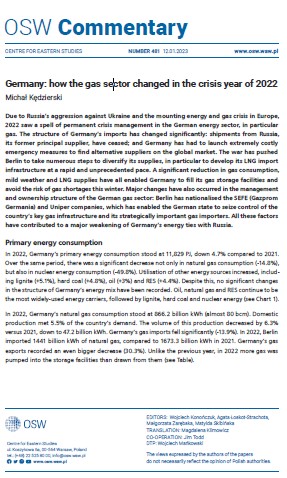Germany: how the gas sector changed in the crisis year of 2022
Germany: how the gas sector changed in the crisis year of 2022
Author(s): Michał Kędzierski
Subject(s): Energy and Environmental Studies, Environmental and Energy policy, Government/Political systems, International relations/trade, Political behavior, Peace and Conflict Studies
Published by: OSW Ośrodek Studiów Wschodnich im. Marka Karpia
Keywords: Germany; Gas sector; gas crisis; LNG supplies; Gazprom Germania; Russia; Primary energy consumption; gas consumption; electricity generation sector;
Summary/Abstract: Due to Russia’s aggression against Ukraine and the mounting energy and gas crisis in Europe,2022 saw a spell of permanent crisis management in the German energy sector, in particular gas. The structure of Germany’s imports has changed significantly: shipments from Russia, its former principal supplier, have ceased; and Germany has had to launch extremely costly emergency measures to find alternative suppliers on the global market. The war has pushed Berlin to take numerous steps to diversify its supplies, in particular to develop its LNG import infrastructure at a rapid and unprecedented pace. A significant reduction in gas consumption, mild weather and LNG supplies have all enabled Germany to fill its gas storage facilities and avoid the risk of gas shortages this winter. Major changes have also occurred in the management and ownership structure of the German gas sector: Berlin has nationalised the SEFE (Gazprom Germania) and Uniper companies, which has enabled the German state to seize control of the country’s key gas infrastructure and its strategically important gas importers. All these factors have contributed to a major weakening of Germany’s energy ties with Russia.
Series: OSW Commentary
- Page Count: 8
- Publication Year: 2023
- Language: English
- Content File-PDF

